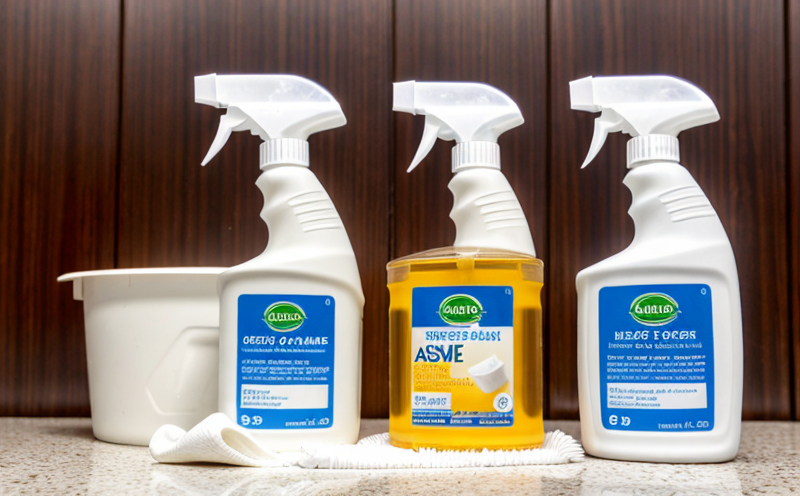ASTM E2362 Residual Antimicrobial Testing on Surfaces
The ASTM E2362 standard provides a protocol for determining the residual antimicrobial activity of cleaning and hygiene products against specified microorganisms after application to surfaces. This testing is crucial in ensuring that antimicrobial properties persist over time, thereby maintaining effective hygiene and reducing bacterial load post-cleaning.
During this test, samples are prepared by applying the product to a surface according to standard methods detailed in ASTM E2362. The specimens are then incubated for an appropriate period before being tested against target microorganisms using standardized microbiological techniques. This process allows for accurate quantification of residual antimicrobial efficacy.
The significance of this test lies in its ability to evaluate the longevity and reliability of antimicrobial properties on surfaces, which is essential for maintaining hygiene standards, especially in healthcare facilities, food processing plants, and other high-risk environments. By ensuring that antimicrobial agents continue to be effective even after initial application, ASTM E2362 supports sustainable practices by promoting continuous protection against microbial contamination.
Implementing this test helps manufacturers comply with regulatory requirements while also enhancing product performance and consumer trust. It enables companies to demonstrate robust quality control measures and contribute positively towards public health goals. Understanding the nuances of ASTM E2362 is vital for those involved in developing, manufacturing, or regulating cleaning and hygiene products.
For instance, understanding how different environmental factors such as temperature, humidity, and surface type influence test outcomes can lead to more accurate product formulations. Additionally, knowing the specific microorganisms targeted by each antimicrobial agent allows for tailored testing protocols that reflect real-world conditions better.
- Why Choose This Test?
This test is ideal for companies looking to ensure their products meet stringent hygiene standards and comply with relevant regulations. It provides valuable insights into the residual efficacy of antimicrobial agents, helping manufacturers optimize product formulations and enhance overall performance.
The test also supports sustainability efforts by promoting continuous protection against microbial contamination without relying solely on initial application. This ensures that surfaces remain hygienic for extended periods, reducing the need for frequent reapplication and minimizing waste associated with disposable products.
Why Choose This Test
Selecting ASTM E2362 residual antimicrobial testing offers several advantages for manufacturers of cleaning and hygiene products:
- Enhanced Product Performance: Ensures that your product maintains its effectiveness over time, enhancing overall hygiene standards.
- Regulatory Compliance: Demonstrates adherence to international quality and safety regulations, which is essential for market access in various regions.
- Increased Consumer Trust: By proving the persistence of antimicrobial properties, you can build confidence among consumers who rely on your products.
- Sustainable Practices: Supports continuous protection against microbial contamination without requiring frequent reapplication or disposal of product.
- Scientific Validation: Provides robust scientific evidence supporting the efficacy and reliability of your cleaning and hygiene solutions.
- Predictable Results: Consistent testing protocols ensure reliable outcomes, facilitating quality control and improvement processes.
- International Acceptance: The test is widely recognized and accepted internationally, enhancing marketability globally.
Choosing ASTM E2362 residual antimicrobial testing not only meets regulatory requirements but also sets your products apart in terms of performance and reliability. This ensures they contribute effectively to maintaining high hygiene standards across various applications.
International Acceptance and Recognition
The ASTM E2362 standard enjoys widespread recognition and acceptance within the global scientific community, regulatory authorities, and industry stakeholders. Its broad applicability makes it a preferred choice for manufacturers seeking to ensure their products meet rigorous hygiene standards.
Many countries reference ASTM E2362 in their national regulations or guidelines for cleaning and hygiene product development and testing. This international acceptance underscores the standard's reliability and relevance across diverse environments, from healthcare settings to public spaces.
The use of this test contributes to harmonized standards that facilitate smoother trade between nations by ensuring consistent quality expectations. It also supports global health initiatives aimed at improving sanitation and reducing infectious disease transmission through effective hygiene measures.
Environmental and Sustainability Contributions
ASTM E2362 residual antimicrobial testing plays a crucial role in promoting sustainable practices by supporting continuous protection against microbial contamination without necessitating frequent reapplication or disposal of products. This approach helps minimize waste generation associated with disposable items, thereby reducing environmental impact.
The persistence of antimicrobial properties ensures that surfaces remain hygienic for extended periods, which can lead to reduced usage rates compared to non-persistent formulations. This reduction in consumption aligns with broader sustainability goals by fostering more efficient resource utilization and lower carbon footprints.
By adhering to ASTM E2362 standards, manufacturers contribute positively towards environmental conservation efforts while simultaneously enhancing product efficacy and user satisfaction. The focus on sustainable practices reflects a commitment to long-term benefits for both consumers and the planet.





